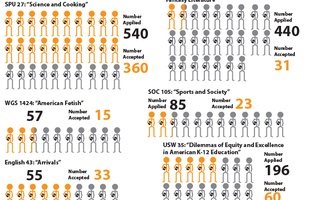WASHINGTON, D.C., Jun. 31--President Johnson signed into law today a new Selective Service act which, in practice, is almost identical to the old.
For the next year at least, the, draft procedures of local boards will remain virtually unchanged. Specifically:
* All college graduates will be guaranteed a 2-S deferment while in good standing. Few undergraduates were drafted under the old law through boards, not compelled to defer them, often asked for students' rank in class or the results of national test scores (both criteria are now eliminated).
* Last year's graduate students will keep their deferments, -- masters candidates for one year, and Ph.D. and professional candidates for no more than four.
* June college graduates entering graduate school this Fall will be deferred for only one year.
* Local boards will continue to draft the oldest first in an eligible pool of men 19 to 26 instead of shifting -- as has been expected -- to men between 19 and 20.
The most sweeping change in the new statute -- elimination of mass graduate school deferments -- will not go into effect until next year. In the interim, the National Security Council will advise the President whether or not ary non-medical-dental deferments should be given. If more deferments are granted, they are expected to be restricted to scientists or engineers.
The new law was signed just a year after the President appointed a blue-ribbon commission, headed by former Assistant Attorney General Burke Marshall, to conduct a thorough review of the draft. The group recommended major changes, including the elimination of all student deferments, the institution of a lottery system, and the reversal of induction order to youngest first.
President Johnson went along with many of the Commission's ideas, supporting particularly the lottery and the shift to the 19-year old pool. On student deferments, however, he committed himself only to ending graduate school deferments.
His proposals, however, fared poorly in Congress. A reluctant House Armed Services Committee wrote a restrictive law, and by the time the bill emerged from a House-Senate conference committee. there was a ban on establishing a lottery without specific new legislation.
Though the President was still empowered to change to the 19-year old pool, the Defense Department cautioned against making the move without a lottery.
The new law apparently delays, but does not end, the prospect of major change in Selective Services. In signing the act, the President directed the Defense Department and the Selective Service System to develop a lottery, which will, probably be submitted to the next session of Congress in January.
If the Administrations wins approval for the lottery, it will almost certainly shift to the 19-year old age group. However, even without this approval the step might be taken in a year's time, according to Defense Department officials.
The Department has continually emphasized that it wants to keep the age of induction low--between 19 and 21. With draft calls running high and with most graduate deferments still in effect, it has estimated that the average age of induction will remain low during the next year period
Read more in News
Special Notices.Recommended Articles
-
Lotteried Classes See Low Admission RatesIt is easier to gain early admission to Harvard College than get into a class with Harry Potter on the syllabus. While Harvard College admitted 18 percent of its early applicants in December, Professor Maria Tatar only admitted 10.5 percent of interested students to her class Folklore and Mythology 90i: “Fairy Tales and Fantasy Literature.”
-
 The Housing Lottery: Then And Now
The Housing Lottery: Then And Now -
Few Hit Jackpot In Course LotteriesAs the number of interested students in some already oversubscribed classes continues to grow and Pre-Term Planning data at times fails to accurately predict student interest, professors face the dilemma of how best to accommodate students while still maintaining the quality of their classes.
-
Senate Candidates Propose Differing Education PlatformsAs voters in the Commonwealth prepare to head to the polls on Tuesday to choose their parties’ nominees for the state’s open U.S. Senate seat, they will have to consider a number of education platforms ranging from consensus proposals to uniquely bold new ideas.
-
 With Demand for Popular Courses High, Course Lotteries See Low Admissions Rates
With Demand for Popular Courses High, Course Lotteries See Low Admissions Rates -
 The Love Song of An Awkward Prefrosh
The Love Song of An Awkward Prefrosh













